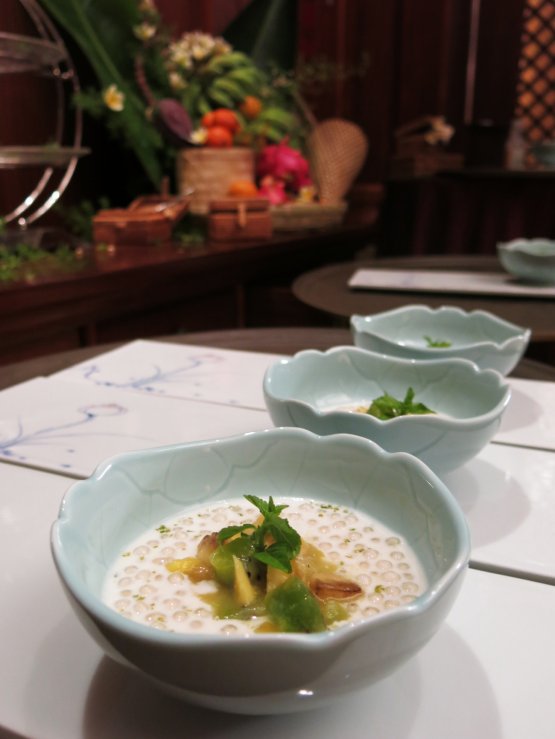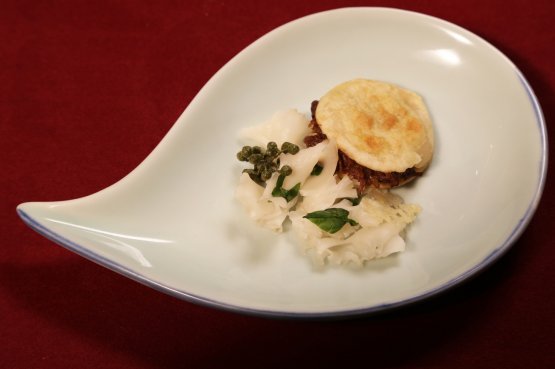Culinary tradition is not a marginal detail in the life of the inhabitants of the Yunnan region. Its microclimate leads to an incredible variety of ingredients resulting in a cuisine that is a mixture, its style not belonging to any of the eight great trends in particular because it draws from all eight of them. When visiting the market in Xishuangbanna, a city in the far South, one is immersed in the local culture, in food and tea secrets, traditions that are rooted and continue to live together with the most modern side of China, traditions that let time run its course, in a universe of its own.
In this different dimension, the gastronomic harmony begins with the choice of the ingredients, measuring the ying and the yang, passes through the eyes, filled with bright colours, and ends with the real taste journey, that goes from cold to hot without the Western sequence in the courses. The satisfaction given by the balance of the perception in the experience is the raison d’etre behind the experience itself. What united on this occasion the young Italian toques was not a gastronomic marathon in honour of Italy, but the recording of a reality show dedicated to high cuisine, namely China Greatest Chef, Italy Edition, a Chinese-Italian joint production that will be broadcasted on Chinese national channel CCTV 2.

Eugenio Boer’s dessert: Tapioca pearls soup with almond milk, fruit salad and healing herbs
The competition is based on nerves and concentration, with a few simple rules. One against the other, the chefs compete, with a table from which they can choose the ingredients in turn, be them orthodox or not, until the last element on the table is picked – and they need to use them all. There are ten minutes to conceive a six-course menu and three hours to prepare it, helped by local staff and a local jury deciding the result of the competition. The chef facing
Eugenio Boer, in this duel fought with woks and steam ovens, was
Liu Peng Mars, sous chef at hotel’s
Grace’s gastronomic restaurant in Beijing, in the 798 district, which using a classic-technique, created a Western-like complex journey.
Chef
Eugenio Boer’s creativity, instead, gave life to an Oriental menu, an ideal journey from Marco Polo to us, following an earth-sea itinerary, playing with ingredients and spices in opulent dishes thanks to biodiversity, but also extremely balanced. Ready in the starting blocks, the
entrées: on the Italian side,
Fruit salad with chilly pepper and green mussel soup with yellow curry, truffle caviar and Chinese mint, while for chef
Liu Peng Mars Fake pasta portion, Chinese turnip, basil, annurche apples, fillets of peeled tomato.

One of Liu Peng Mars’s dishes: Rou Jia Mo (meat sandwich) with donkey sauce, mushroom salad, fresh Shichuan pepper and pasta wafers and Grana Padano cheese
This was followed by
Boer’s
Jellyfish salad, spicy grapefruit and rocket salad, while the competitor presented
Grilled tofu with lacquered duck gizzard, pea sprouts. In a
crescendo of intensity,
Duck and shitake mushroom soup, followed closely on the Chinese side by
Rou Jia Mo (meat sandwich) with donkey meat sauce, mushroom salad, fresh shichuan pepper pasta wafers and Grana Padano cheese. For
Boer Fresh noodles, beef, soy sprouts, cabbage and tomato fillets opposed by
Magret de canard and reduction, pesto and spicy fried tofu.
To end the dinner, they both proposed a complex dish. The Italian-Dutch chef presented a
Wrapper-cooked deep-water stone bass with concasséed vegetables, corn with pork rind, purple potatoes with fermented loufu and truffle water, while chef
Liu Peng served
Poached quail egg and pigeon in three versions: breast, leg and soup. As for the dessert
, Tapioca pearls soup with almond milk, fruit salad and healing herbs on one side, and
Pumpkin mousse with apricot chocolate, almond, chilly pepper and maldon salt, and dried milk cream with chocolate and balsamic vinegar cream. This wearing and full of character test will soon be repeated in Italy for the away game, in front of a jury that this time will be entirely Milanese.